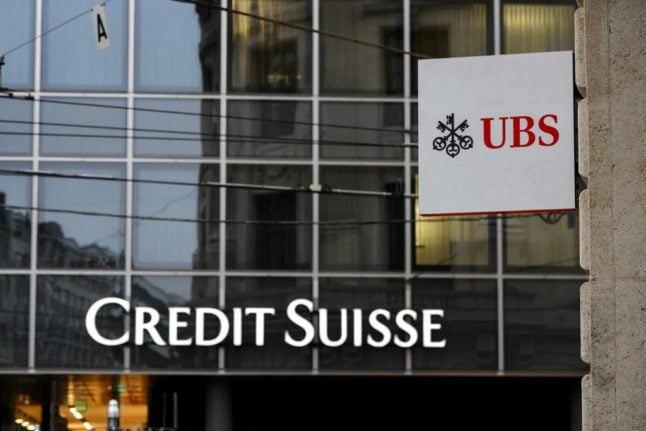How safe is your money in a Swiss bank?

After the recent collapse of Silicon Valley Bank (SVB) in the US, and as shares in Credit Suisse tumble you may be worried that the same could happen to your bank in Switzerland, causing you to lose all your assets. How likely is this?
As shocking as the collapse of the California-based bank was, a series of specific and unfortunate failures hastened its demise.
Rather than being a general commercial bank, the SVB’s dealings focused heavily on the tech sector — one of the region’ s main industries.
As the sector experienced a bit of a slowdown amid job cuts and other downward trends, many of SVB’s customers began to withdraw their funds.
To top up its dwindling reserves, the bank started to sell off its main investments – US government bonds — which are traditionally one of the safest types of investment.
However, the bonds were sold at their original low prices, while the new rates are much higher.
As a result, the bank lost $1.8 billion, which prompted even more panicked clients to withdraw their deposits simultaneously, basically emptying the SVB if all its holdings.
While a number of banks had collapsed during the 2008 global financial crisis, this is an unusual event in the past 15 years.
Can this happen in Switzerland as well?
On Wednesday, Credit Suisse's shares plunged to new lows as its main shareholder said it would not provide more financial assistance to the embattled Swiss banking giant.
"The answer is absolutely not, for many reasons outside the simplest reason which is regulatory and statutory," Saudi National Bank Chairman Ammar Al Khudairy said in an interview with Bloomberg TV.
The lender's shares close down more than 24 percent on Wednesday.
Credit Suisse's market value already fell further this week over fears of contagion from the collapse of two US banks and its annual report citing "material weaknesses" in internal controls.
Credit Suisse has endured a barrage of problems in recent years, including its exposure to the implosions of US asset manager Archegos and UK firm Greensill in 2021.
In general, many myths surround Switzerland’s financial institutions, primarily related to their (alleged) shady sides — dirty money, illicit holdings, and secret bank accounts foremost among them.
READ MORE: Gold, secrecy and wealth: Six Swiss bank myths that need to be busted
Despite the scandals that have famously hit the likes of Credit Suisse and UBS, no Swiss bank has collapsed. Yet.
“Generally, we assume that the affected American banks are ‘special cases’ that are not comparable with the situation in Switzerland,” Robert Reinecke, spokesperson for Swiss Banking Association (SBA), told The Local.
Swiss banks are “very safe,” in international comparison, both in terms of capital and liquidity, according to Reinecke.
“They have a very robust capital base even in stress scenarios,” he added.

UBS and Credit Suisse were involved in scandals but Swiss banks remain trustworthy. Photo by Fabrice COFFRINI / AFP
How is your money protected?
Assets deposited in either Swiss banks or foreign financial institutions that operate a branch in Switzerland must be licensed, regulated, and supervised by the Swiss Financial Market Supervisory Authority FINMA.
As an additional safety measure, "Swiss law demands capital adequacy standards” to ensure solvency, according to SBA, an umbrella group encompassing 260 banks and other financial service providers in Switzerland. Swiss banks can therefore be counted among the safest in the world."
As an additional protection against losses, all financial institutions in the country must be members of the deposit insurance scheme, esisuisse, which takes effect in case a bank nevertheless becomes insolvent.
Also, the law lays down strict conditions that banks must meet in order to accept client deposits. For example, banks must hold sufficient capital and liquidity to be able to pay out their client deposits at any time, esuisse says.
All the while, “FINMA supervises banks on an ongoing basis to ensure that they comply with these strict rules,” according to esuisse. "If a bank gets into financial difficulty, FINMA can order protective or restructuring measures to avert bankruptcy."
Will you get any of your money back if the bank collapses nevertheless?
Your deposits are covered up to 100, 000 francs, in line what the FDIC (Federal Deposit Insurance Corporation ) in the US guarantees.
There are, however, additional protections in place for customers of cantonal banks.
According to Moneyland consumer platform, “many cantonal governments fully guarantee the account balances of their corresponding cantonal banks."
All but three cantonal banks benefit from unlimited state depositor protection guarantees. The three exceptions are: the Banque Cantonale Vaudoise; the Berner Kantonalbank; and the Banque Cantonale de Genève. PostFinance formerly benefited from a federal state guarantee, but this guarantee no longer applies."
For banks which are covered by state guarantees, full account balances will be paid out, Moneyland said.
READ MORE: How to open a bank account in Switzerland
With reporting by AFP
Comments
See Also
As shocking as the collapse of the California-based bank was, a series of specific and unfortunate failures hastened its demise.
Rather than being a general commercial bank, the SVB’s dealings focused heavily on the tech sector — one of the region’ s main industries.
As the sector experienced a bit of a slowdown amid job cuts and other downward trends, many of SVB’s customers began to withdraw their funds.
To top up its dwindling reserves, the bank started to sell off its main investments – US government bonds — which are traditionally one of the safest types of investment.
However, the bonds were sold at their original low prices, while the new rates are much higher.
As a result, the bank lost $1.8 billion, which prompted even more panicked clients to withdraw their deposits simultaneously, basically emptying the SVB if all its holdings.
While a number of banks had collapsed during the 2008 global financial crisis, this is an unusual event in the past 15 years.
Can this happen in Switzerland as well?
On Wednesday, Credit Suisse's shares plunged to new lows as its main shareholder said it would not provide more financial assistance to the embattled Swiss banking giant.
"The answer is absolutely not, for many reasons outside the simplest reason which is regulatory and statutory," Saudi National Bank Chairman Ammar Al Khudairy said in an interview with Bloomberg TV.
The lender's shares close down more than 24 percent on Wednesday.
Credit Suisse's market value already fell further this week over fears of contagion from the collapse of two US banks and its annual report citing "material weaknesses" in internal controls.
Credit Suisse has endured a barrage of problems in recent years, including its exposure to the implosions of US asset manager Archegos and UK firm Greensill in 2021.
In general, many myths surround Switzerland’s financial institutions, primarily related to their (alleged) shady sides — dirty money, illicit holdings, and secret bank accounts foremost among them.
READ MORE: Gold, secrecy and wealth: Six Swiss bank myths that need to be busted
Despite the scandals that have famously hit the likes of Credit Suisse and UBS, no Swiss bank has collapsed. Yet.
“Generally, we assume that the affected American banks are ‘special cases’ that are not comparable with the situation in Switzerland,” Robert Reinecke, spokesperson for Swiss Banking Association (SBA), told The Local.
Swiss banks are “very safe,” in international comparison, both in terms of capital and liquidity, according to Reinecke.
“They have a very robust capital base even in stress scenarios,” he added.

How is your money protected?
Assets deposited in either Swiss banks or foreign financial institutions that operate a branch in Switzerland must be licensed, regulated, and supervised by the Swiss Financial Market Supervisory Authority FINMA.
As an additional safety measure, "Swiss law demands capital adequacy standards” to ensure solvency, according to SBA, an umbrella group encompassing 260 banks and other financial service providers in Switzerland. Swiss banks can therefore be counted among the safest in the world."
As an additional protection against losses, all financial institutions in the country must be members of the deposit insurance scheme, esisuisse, which takes effect in case a bank nevertheless becomes insolvent.
Also, the law lays down strict conditions that banks must meet in order to accept client deposits. For example, banks must hold sufficient capital and liquidity to be able to pay out their client deposits at any time, esuisse says.
All the while, “FINMA supervises banks on an ongoing basis to ensure that they comply with these strict rules,” according to esuisse. "If a bank gets into financial difficulty, FINMA can order protective or restructuring measures to avert bankruptcy."
Will you get any of your money back if the bank collapses nevertheless?
Your deposits are covered up to 100, 000 francs, in line what the FDIC (Federal Deposit Insurance Corporation ) in the US guarantees.
There are, however, additional protections in place for customers of cantonal banks.
According to Moneyland consumer platform, “many cantonal governments fully guarantee the account balances of their corresponding cantonal banks."
All but three cantonal banks benefit from unlimited state depositor protection guarantees. The three exceptions are: the Banque Cantonale Vaudoise; the Berner Kantonalbank; and the Banque Cantonale de Genève. PostFinance formerly benefited from a federal state guarantee, but this guarantee no longer applies."
For banks which are covered by state guarantees, full account balances will be paid out, Moneyland said.
READ MORE: How to open a bank account in Switzerland
With reporting by AFP
Join the conversation in our comments section below. Share your own views and experience and if you have a question or suggestion for our journalists then email us at [email protected].
Please keep comments civil, constructive and on topic – and make sure to read our terms of use before getting involved.
Please log in here to leave a comment.